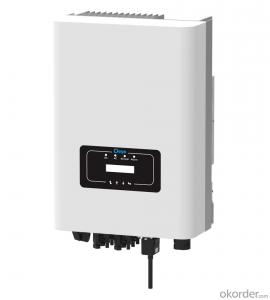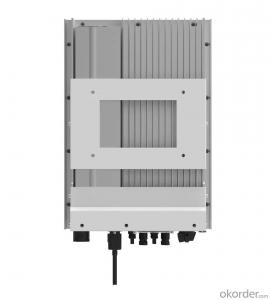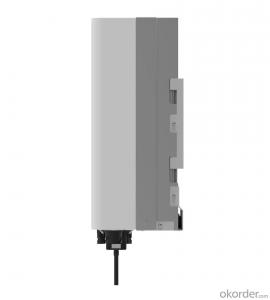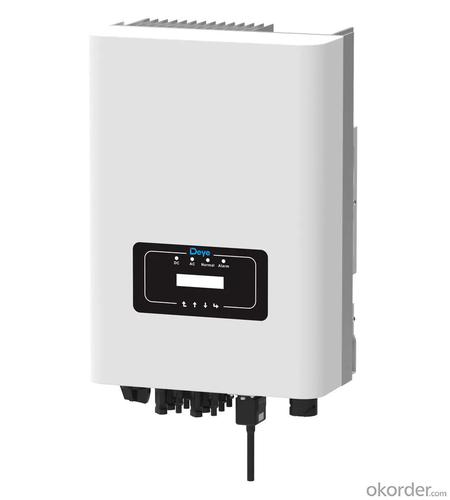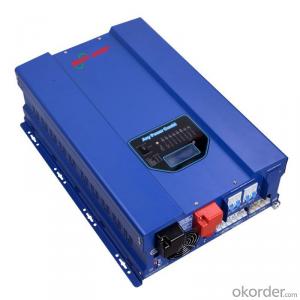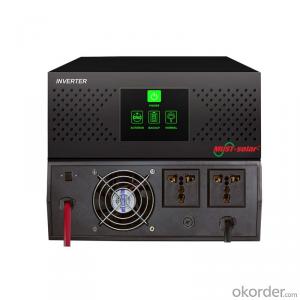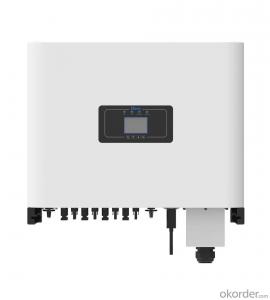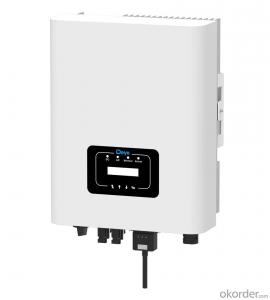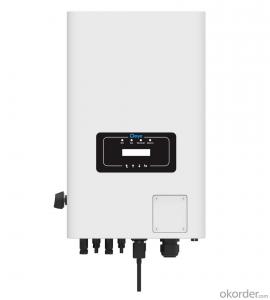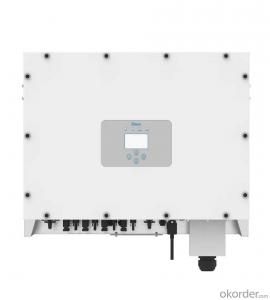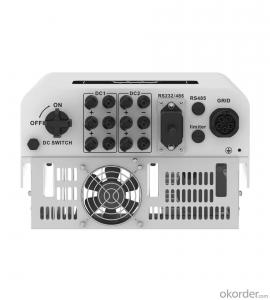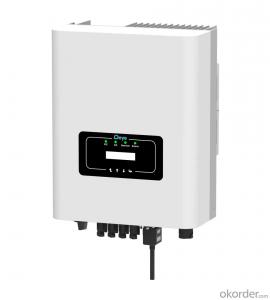Lux Solar Inverter - Sun-18/20/25k-G04 | 18-25kW | Three Phase | 2 MPPT
- Loading Port:
- Ningbo
- Payment Terms:
- TT OR LC
- Min Order Qty:
- 100 pc
- Supply Capability:
- 5000 pc/month
OKorder Service Pledge
OKorder Financial Service
You Might Also Like
Specification
| Technical Data | |||||
| Model | SUN-18K-G04 | SUN-20K-G04 | SUN-25K-G04 | ||
| Input Side | |||||
| Max. DC Input Power (kW) | 23.4 | 26 | 32.5 | ||
| Max. DC Input Voltage (V) | 1000 | ||||
| Start-up DC Input Voltage (V) | 250 | ||||
| MPPT Operating Range (V) | 200~850 | ||||
| Max. DC Input Current (A) | 32+32 | ||||
| Max. Short Circuit Current (A) | 48+48 | ||||
| Number of MPPT / Strings per MPPT | 2/2 | ||||
| Output Side | |||||
| Rated Output Power (kW) | 18 | 20 | 25 | ||
| Max. Active Power (kW) | 19.8 | 22 | 27.5 | ||
| Nominal Output Voltage / Range (V) | 3L/N/PE 380V/0.85Un-1.1Un, 400V/0.85Un-1.1Un | ||||
| Rated Grid Frequency (Hz) | 50 / 60 (Optional) | ||||
| Operating Phase | Three phase | ||||
| Rated AC Grid Output Current (A) | 26.1 | 29 | 36.2 | ||
| Max. AC Output Current (A) | 28.7 | 31.9 | 39.8 | ||
| Output Power Factor | 0.8 leading to 0.8 lagging | ||||
| Grid Current THD | <3%< span=""> | ||||
| DC Injection Current (mA) | <0.5%< span=""> | ||||
| Grid Frequency Range | 47~52 or 57~62 (Optional) | ||||
| Efficiency | |||||
| Max. Efficiency | 98.6% | ||||
| Euro Efficiency | 97.8% | ||||
| MPPT Efficiency | >99% | ||||
| Protection | |||||
| DC Reverse-Polarity Protection | Yes | ||||
| AC Short Circuit Protection | Yes | ||||
| AC Output Overcurrent Protection | Yes | ||||
| Output Overvoltage Protection | Yes | ||||
| Insulation Resistance Protection | Yes | ||||
| Ground Fault Monitoring | Yes | ||||
| Anti-islanding Protection | Yes | ||||
| Temperature Protection | Yes | ||||
| Integrated DC Switch | Yes | ||||
| Remote software upload | Yes | ||||
| Remote change of operating parameters | Yes | ||||
| Surge protection | DC Type II / AC Type II | ||||
| General Data | |||||
| Size (mm) | 330W×508H×206D | ||||
| Weight (kg) | 20.8 | ||||
| Topology | Transformerless | ||||
| Internal Consumption | <1W (Night) | ||||
| Running Temperature | -25~65℃, >45℃ derating | ||||
| Ingress Protection | IP65 | ||||
| Noise Emission (Typical) | <45 dB | ||||
| Cooling Concept | Smart cooling | ||||
| Max. Operating Altitude Without Derating | 2000m | ||||
| Warranty | 5 years | ||||
| Grid Connection Standard | CEI 0-21, VDE-AR-N 4105, NRS 097, IEC 62116, IEC 61727, G99, G98, VDE 0126-1-1, RD 1699, C10-11 | ||||
| Operating Surroundings Humidity | 0-100% | ||||
| Safety EMC / Standard | IEC/EN 61000-6-1/2/3/4, IEC/EN 62109-1, IEC/EN 62109-2 | ||||
| Features | |||||
| DC Connection | MC-4 mateable | ||||
| AC Connection | IP65 rated plug | ||||
| Display | LCD1602 | ||||
| Interface | RS485/RS232/Wifi/LAN | ||||
This new series of three-phase output inverter has wider range of 18kw, 20kw, 25kw than the original series, at the same time still got two integrated MPPTs, allowing two-array to input from different roof orientations. In addition, it allows the system to be monitored and controlled remotely.
2 MPP tracker, Max. efficiency up to 98.6%
Zero export application, VSG application
String intelligent monitoring (optional)
Wide output voltage range
Anti-PID function (Optional)
- Q: What is the difference between a string inverter and a micro inverter?
- A string inverter is a type of solar inverter that is connected to a series of solar panels, converting the DC power produced by the panels into AC power for use in homes or businesses. A micro inverter, on the other hand, is installed on each individual solar panel, converting the DC power into AC power at the panel level. The main difference between the two is that a string inverter handles the entire string of panels, while a micro inverter operates on a per-panel basis. This means that micro inverters offer advantages such as increased energy production, better module-level monitoring, and improved system flexibility, but they can also be more expensive and complex to install compared to string inverters.
- Q: Can a solar inverter be used with solar-powered air conditioning systems?
- Yes, a solar inverter can be used with solar-powered air conditioning systems. The solar inverter is responsible for converting the direct current (DC) generated by the solar panels into alternating current (AC) that can be used to power various electrical appliances, including air conditioning units. By connecting the solar inverter to the solar panels and the air conditioning system, the generated solar energy can be efficiently utilized to power the AC system.
- Q: What is the role of a maximum power control feature in a solar inverter?
- The role of a maximum power control feature in a solar inverter is to optimize the energy output of the solar panels by constantly tracking the maximum power point (MPP) of the solar array. This feature adjusts the operating conditions of the inverter to ensure that it operates at the highest possible efficiency, maximizing the energy harvested from the solar panels and improving overall system performance.
- Q: Can a solar inverter be used with building-integrated photovoltaic systems?
- Yes, a solar inverter can be used with building-integrated photovoltaic systems. The solar inverter converts the direct current (DC) electricity generated by the photovoltaic panels into alternating current (AC) electricity that can be used to power the building or be fed into the grid.
- Q: What is the maximum short-circuit current that a solar inverter can handle?
- The maximum short-circuit current that a solar inverter can handle varies depending on the specific model and design. However, most solar inverters are designed to handle short-circuit currents ranging from 500 Amps to 10,000 Amps, depending on the size and capacity of the inverter.
- Q: How long does it take to install a solar inverter?
- The installation time for a solar inverter can vary depending on various factors such as the size of the system, complexity of the installation, and the expertise of the installer. Generally, it can take anywhere from a few hours to a full day to complete the installation process.
- Q: What is the typical size and weight of a solar inverter?
- The typical size and weight of a solar inverter can vary depending on the capacity or power rating of the system. However, in general, residential solar inverters are compact and lightweight, with dimensions around 14-18 inches wide, 20-24 inches tall, and 6-8 inches deep. Their weight usually ranges between 25-50 pounds. Commercial or utility-scale solar inverters, on the other hand, can be much larger and heavier, often weighing hundreds or even thousands of pounds.
- Q: Are solar inverters weatherproof?
- Yes, solar inverters are designed to be weatherproof. They are typically built to withstand various weather conditions such as rain, snow, and extreme temperatures. However, it is always recommended to consult the manufacturer's specifications and guidelines to ensure proper installation and protection against environmental factors.
- Q: How is a solar inverter connected to the solar panels?
- A solar inverter is connected to the solar panels through a direct electrical connection. The DC (direct current) electricity generated by the solar panels is fed into the inverter, which then converts it into AC (alternating current) electricity suitable for use in homes and businesses.
- Q: Is the PV inverter a current source or a voltage source?
- The inverter is mainly composed of a switching element such as a transistor, and turns the DC input into an AC output by repeatedly turning ON-OFF the switching element in a regular manner.
Send your message to us
Lux Solar Inverter - Sun-18/20/25k-G04 | 18-25kW | Three Phase | 2 MPPT
- Loading Port:
- Ningbo
- Payment Terms:
- TT OR LC
- Min Order Qty:
- 100 pc
- Supply Capability:
- 5000 pc/month
OKorder Service Pledge
OKorder Financial Service
Similar products
Hot products
Hot Searches
Related keywords
